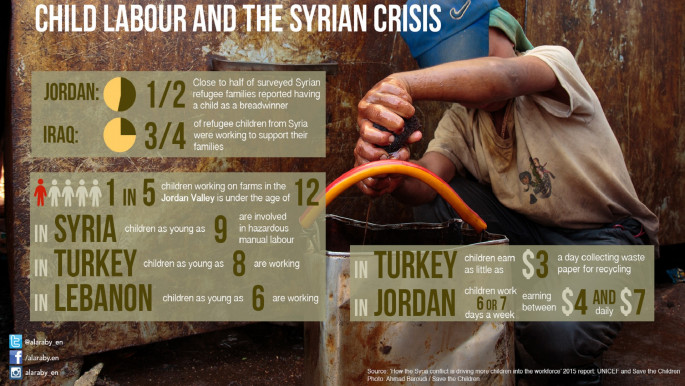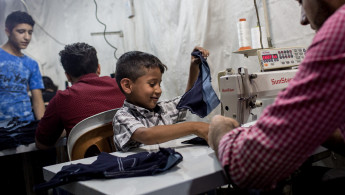Syrian refugee children 'are making clothes for international brands'
Syrian refugee children 'are making clothes for international brands'
Syrian refugee children as young as 7 are working in dismal conditions in Turkey, sewing clothes for international brands including some based in Britain, a BBC Panorama investigation has revealed
2 min read
Syrian child refugees are illegally making clothes for top brands [Getty]
Syrian refugee children as young as 7 could be working in dismal conditions in Turkey, sewing clothes for international brands including some based in Britain, a BBC Panorama investigation has revealed.
The investigation is consistent with the findings of a UN probe last year. At the time, the UN said Syrian refugees in Turkey were almost exclusively working in "low-quality, low-paid" jobs.
A November 2015 report by the Turkish Confederation of Employer Associations (TISK) found that at least 300,000 Syrians are working in the country, many of whom without proper work permits.
The number of "child labourers" among them was already quite high.
Syrian children below the age of 18 are more likely to find a job compared to adults, especially in border regions, the report said.
The Panorama investigation saw a basement workshop in Turkey almost entirely staffed with children, many of whom young children 7 or 8 years of age.
Through secret filming in difficult conditions, the undercover investigation team said it found that children were being exploited by the garment industry, to produce clothes destined for the British High Street.
Many of the children were working in "cramped and airless" conditions. The investigators say finding Syrian refugees and children making branded clothes for the UK market was "straightforward".
Since child labour is illegal in Turkey, while Syrian refugee labour is restricted, the children end up being exploited. The children are being paid a little over $1 an hour, some working for 12 hours a day, according to the investigation.
The investigators found the children were working for factories producing clothes for some of the world's leading brands, but did not name them.
Although the brands carry out routine audits to ensure no such violations occur in their supply chains, the investigators from the British broadcaster found out that the children are kept hidden during inspection rounds, avoiding auditors.
Factories also avoid being caught by deploying other tactics, such as sub-contracting and outsourcing some operations, ostensibly without the knowledge of the brands themselves.
The full investigation will air on the BBC on Monday.

The investigation is consistent with the findings of a UN probe last year. At the time, the UN said Syrian refugees in Turkey were almost exclusively working in "low-quality, low-paid" jobs.
A November 2015 report by the Turkish Confederation of Employer Associations (TISK) found that at least 300,000 Syrians are working in the country, many of whom without proper work permits.
The number of "child labourers" among them was already quite high.
Syrian children below the age of 18 are more likely to find a job compared to adults, especially in border regions, the report said.
The Panorama investigation saw a basement workshop in Turkey almost entirely staffed with children, many of whom young children 7 or 8 years of age.
Through secret filming in difficult conditions, the undercover investigation team said it found that children were being exploited by the garment industry, to produce clothes destined for the British High Street.
Many of the children were working in "cramped and airless" conditions. The investigators say finding Syrian refugees and children making branded clothes for the UK market was "straightforward".
Since child labour is illegal in Turkey, while Syrian refugee labour is restricted, the children end up being exploited. The children are being paid a little over $1 an hour, some working for 12 hours a day, according to the investigation.
The investigators found the children were working for factories producing clothes for some of the world's leading brands, but did not name them.
Although the brands carry out routine audits to ensure no such violations occur in their supply chains, the investigators from the British broadcaster found out that the children are kept hidden during inspection rounds, avoiding auditors.
Factories also avoid being caught by deploying other tactics, such as sub-contracting and outsourcing some operations, ostensibly without the knowledge of the brands themselves.
The full investigation will air on the BBC on Monday.




